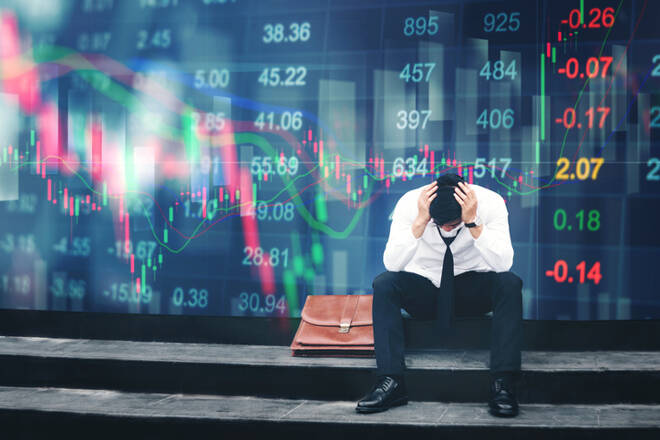Advertisement
Advertisement
Global Shares Routed as Investors Ditch Risky Assets on Fear of Worldwide Recession
By:
Hopes that that the epidemic that started in China would be over in a few months and economic activity would return to normal have been shattered. Fear as measured by the CBOE volatility index or VIX, jumped to 39.16, the highest level in about two years.
The major European stock indexes are trading sharply lower on Friday after entering correction territory the previous session, after falling 10% below the record highs seen on February 19. This follows steep sell-offs in seven major Asia-Pacific markets and the United States, which have also reached correction territory.
It took just six days for the benchmark S&P 500 and NASDAQ Composite Indexes to fall from record highs into correction territory. On Thursday, the blue chip Dow Jones Industrial Average plunged 1,200 points, its biggest one-day drop ever.
In Europe, at 11:44 GMT, the UK’s FTSE 100 Index is trading 6602.33, down 194.07 or -2.86%. Germany’s DAX Index is at 11974.17, down 393.29 or -3.18% and France’s CAC is trading 5354.27, down 141.33 or -2.57%.
Global Stocks Set for Worst Week Since 2008 Financial Crisis
World share markets were headed for their worst week since the depths of the 2008 financial crisis as investors ditched risky assets on fears the coronavirus would become a pandemic and trigger a global recession, Reuters said.
Hope that Fed Comes to the Rescue
Hopes that that the epidemic that started in China would be over in a few months and economic activity would return to normal have been shattered, as new infections reported around the world now surpass those in China.
Hope remains, however, that the U.S. Federal Reserve would cut interest rates as soon as next month to support economic growth.
“We don’t even need to wait for economic data to wee how badly the economy is being hit. You can tell that the sales of airlines and hotels are already falling by a half or something like that,” said Tomoaki Shishido, senior economist at Nomura Securities.
“It is fair to say the impact of the coronavirus will be clearly much bigger than the U.S.-China trade war. So the Fed does not have a reason to take a wait-and-see stance next month,” Shishido said.
Expectations the Fed will cut interest rates to cushion the blow are rising in money markets. Analysts say Fed funds futures are now pricing in about a 75% chance of a 25-basis point cut at the central bank’s March 17-18 meeting.
Fear of Major Global Economic Slump
Fear of a major economic slump is driving commodity and equity prices lower.
Fear as measured by the CBOE volatility index or VIX, jumped to 39.16, the highest level in about two years, well out of the 11-20 range of recent months, according to Reuters.
The index, which measures expected swings in U.S. shares in the next 30 days, typically shoots up to around 50 when bear market selling hits is heaviest and approached almost 90 during the 2008-09 financial crisis, Reuters wrote.
“The coronavirus now looks like a pandemic. Markets can cope even if there is a big risk as long as we can see the end of the tunnel,” said Norihiro Fujito, chief investment strategist at Mitsubishi UFJ Morgan Stanley Securities. “But at the moment, no one can tell how long this will last and how severe it will get.”
About the Author
James Hyerczykauthor
James Hyerczyk is a U.S. based seasoned technical analyst and educator with over 40 years of experience in market analysis and trading, specializing in chart patterns and price movement. He is the author of two books on technical analysis and has a background in both futures and stock markets.
Advertisement
